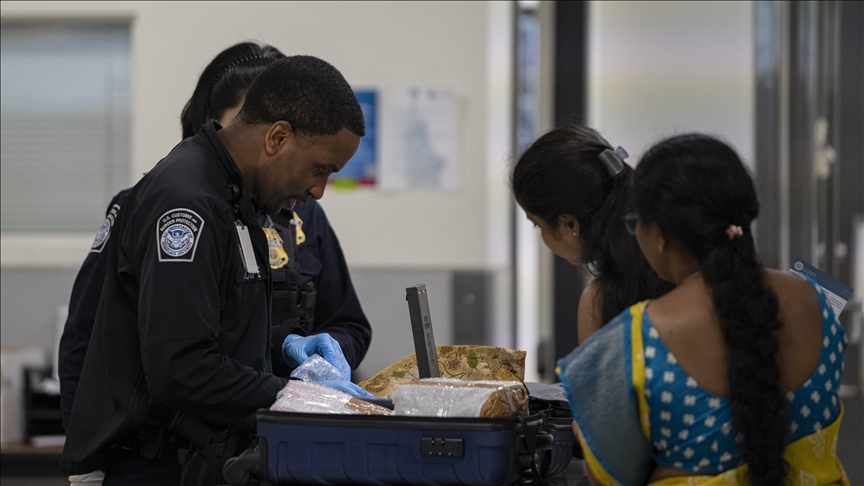No new entry procedures for foreign nationals at US airports: Border officials
Officials say existing laws and screening processes remain unchanged in Trump’s 2nd term amid concerns over denied entries related to support for Gaza
 A general view of Dulles International Airport during a media briefing tour organized by the U.S. Department of State’s Foreign Press Center to present procedures related to incoming foreign nationals in Washington, United States, on June 29, 2025.
A general view of Dulles International Airport during a media briefing tour organized by the U.S. Department of State’s Foreign Press Center to present procedures related to incoming foreign nationals in Washington, United States, on June 29, 2025.
WASHINGTON
US Customs and Border Protection (CBP) officials at Washington Dulles Airport said that no new procedures have been introduced for foreign nationals entering the country following the start of President Donald Trump’s second term this January.
CBP officers have the legal authority to refuse entry to foreign nationals arriving in the US, even if they have valid visas. Entry can be refused for various reasons, including carrying prohibited plants, photos on their phones deemed inappropriate, or certain posts on social media.
Recently, the growing number of reports about travelers allegedly being denied entry to the US due to their support for Gaza have raised concerns among those entering the country.
During a reporting visit organized by the US State Department’s Foreign Press Center, Matthew Armour, the CBP supervisor at Washington Dulles, told Anadolu about the process that the passengers undergo.
In response to journalists’ inquiries about whether foreign nationals entering the US face stricter controls under the Trump administration, Armour said: “Nothing has changed. We are continuing to operate according to the same laws and regulations.”
Armour said social media reviews or phone inspections can be part of “secondary screening.”
Rasha Alawieh, an assistant professor at Brown University, arrived at Boston Logan Airport on March 13. According to court documents and US media reports, photos found on her phone included images of late Hezbollah leader Hasan Nasrallah, who was killed in an Israeli airstrike, and pictures from a memorial ceremony held for him in Beirut.
Alawieh was denied entry following a CBP interview and was sent back to Lebanon on the next flight.
‘Not a carte blanche inspection’
Armour emphasized that phone checks are done only when necessary, saying: “So the key word there is ‘if needed.’ It's not a carte blanche inspection. We're not just arbitrarily just going through every single corner of a phone. So, there is generally going to be a targeted search. We're looking for something specific and it's based on your individual inspection.”
Confirming the CBP’s authority to review social media accounts, he added: “So social media is generally something, if we're going to go through that, that's going to be in a secondary inspection environment. And that's looking for the additional information of, why are you coming here? What is the purpose of your travel, those sorts of things. So that's where you're most likely going to see that.”
Armour stressed that these methods are reserved for special circumstances and are not applied universally: “Is it within our authority to search those items, it is. But we use our discretion when we're looking to use that that search parameter.”
On whether the CBP can assess documents in different languages or from various groups related to terrorism or international crime, CBP Public Affairs Officer Steve Sapp told Anadolu that for persons of interest in such investigations, the CBP relies on the US intelligence-sharing network.
The CBP works with multiple agencies, he said, including Interpol, the FBI, Homeland Security, the Drug Enforcement Administration, and the CIA, which collect and store information in law enforcement databases accessible to the CBP.
“Before your flight arrives into the United States, (the) passenger manifest has already (been) submitted to these guys (CBP), and they’re already doing their targeting,” he added, referring to the National Targeting Center.
CBP officials said an average of 60,000 passengers pass through Washington Dulles Airport daily, with very few being turned away.
The officials stressed that travelers who present necessary documents, such as hotel reservations, travel itineraries, or education and work schedules, are generally allowed entry, and confirmed that there have been no changes to US immigration laws or procedures.
Anadolu Agency website contains only a portion of the news stories offered to subscribers in the AA News Broadcasting System (HAS), and in summarized form. Please contact us for subscription options.


